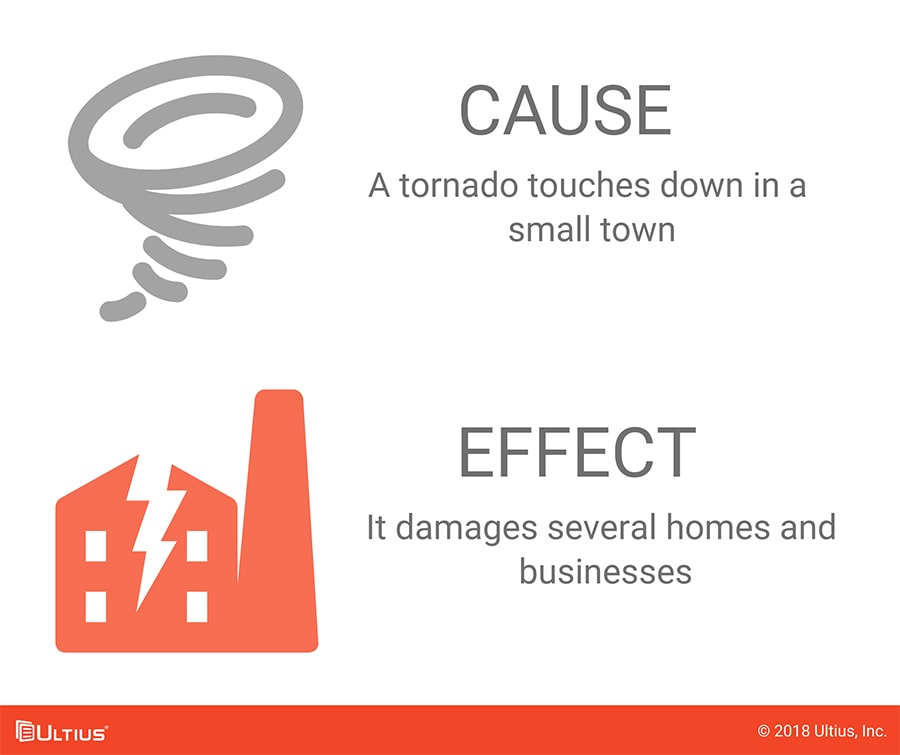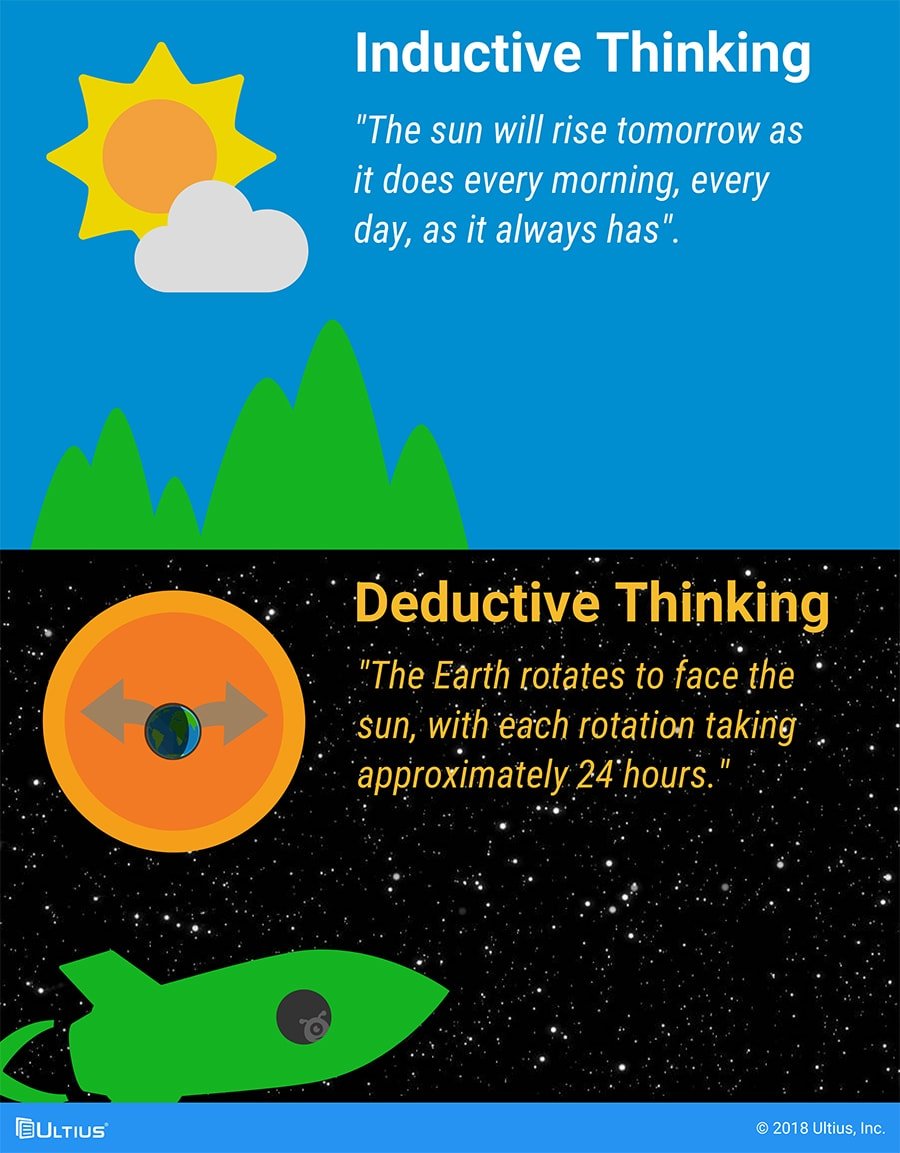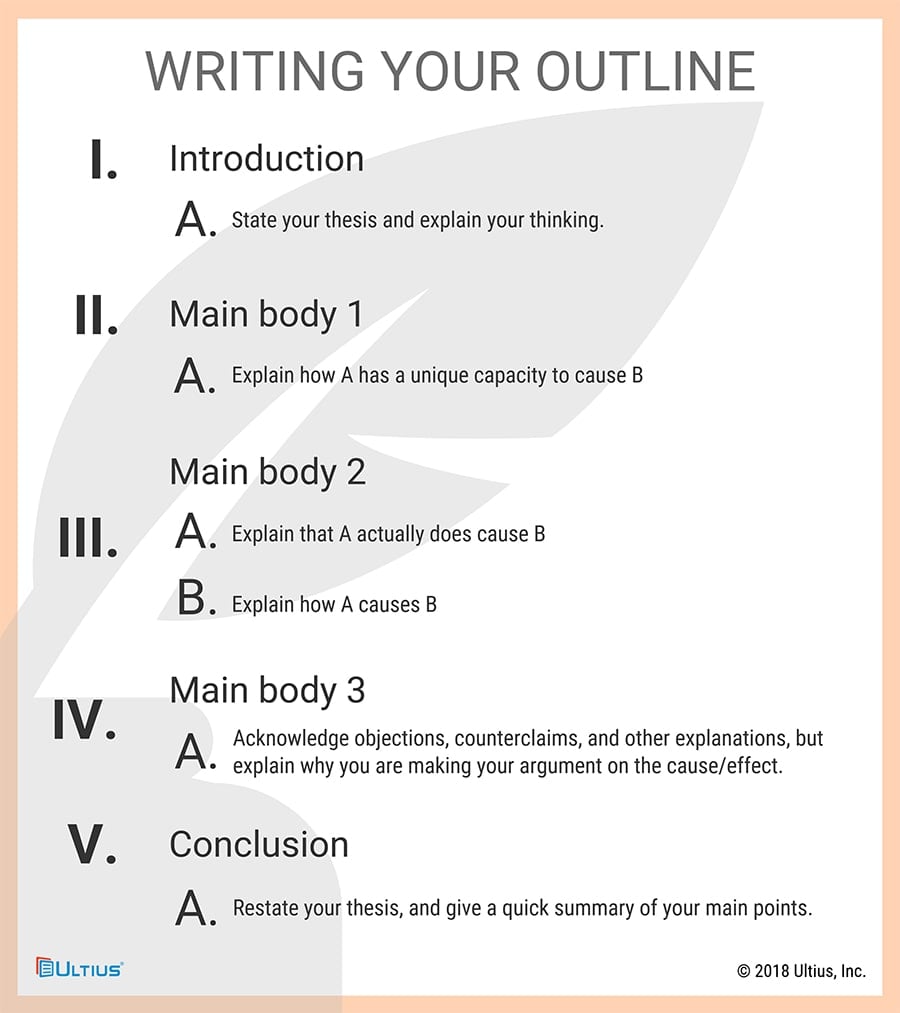How to write a cause and effect essay
A step-by-step guide with instructions, outlines, and samples
Great cause and effect essays establish causality between two things by having a strong thesis statement and then backing it up with logical reasoning (such as deductive reasoning). Writing great cause and effect essays also means avoiding biases or fallacies.
A cause and effect essay is a type writing that may be required of you in college. This article will provide you with a thorough overview of how to write a cause and effect essay. The article will address the following areas:
- Purpose of cause and effect essays
- Avoiding bias and fallacies
- Developing your argument
- Tips and practices for writing a cause and effect essay
By the end of this guide from Ultius, you should feel confident when it comes to the cause and effect essay and that you will be accustomed this kind of writing if or when it is assigned to you.
Purpose of cause and effect essays
The purpose of a cause and effect essay is to demonstrate that a particular effect follows from a particular cause. There are a variety of different ways to think about this abstract idea in more concrete terms. The basic formula is that A causes B, where A and B are distinguishable events, people, conditions, phenomena, etc.
Fireworks are a good example of cause and effect. The cause is lighting the fuse, and the effect(s) of lighting that fuse are the lights and sounds of the firework.
What is crucial with a cause and effect essay is that the writer is not just establishing that there is a relationship between two things.
There are many relationships we can discover in life and nature which are not causal relations. For example, where there are trees there are usually birds, but trees do not cause birds.
Or to give another example, a felon very probably drank milk as a child, but milk drinking does not cause criminal behavior.
In this article we will provide an overview of causality to promote a better understanding of just what exactly a cause and effect essay is intended to do, and provide a basic reasoning and composition guide to making a strong argument in a cause and effect essay.
Overview of causality and the “Principle of Causation”
The very notion of cause and effect is deeply embedded in Western thought and in human thought in general.
Analyzing the four causes
More than two thousand years ago, the Greek philosopher Aristotle developed a metaphysical framework of four causes.
| Material Cause: | The matter of a thing | A chair’s matter is wood |
| Formal Cause: | The shape of a thing | A chair’s form is that it has legs, a seat, and a backrest |
| Efficient Cause: | The agent who makes, creates, or brings about a thing | A carpenter or laborer combines the matter and form into a chair |
| Final Cause: | The purpose for which a thing exists | The chair exists to be sat upon |
For most cause and effect essays, efficient causes are what are under examination. Rarely will it be the case outside of philosophy essays or perhaps the applied sciences that material, formal, or final causes will need to be demonstrated.
Change in causation
In most subject areas a cause and effect essay will be asking the writer to develop an argument showing that a particular agent is responsible for effecting a particular change.
Change is the fundamental object of consideration in a cause and effect essay. To say that there even is such a thing as “cause and effect” is no different in principle from saying that there is such a thing as change.
When we attempt to understand the causal relationship between two things, we are attempting to understand why a certain change occurred and what agent was responsible for affecting the change.
An agent need not be a person. An agent is simply a thing which has the power to effect change. It may be a person, but it also may be an event, or a certain condition or set of circumstances.
The idea of an agent having the power or capacity to effect a particular change brings us to the principle of causation. The principle of causation, or the principle of causality, can be summed up as a principle of reasoning which states that a) things that come into existence have a cause and b) that the efficient cause (i.e. the agent bringing about the effect) of an effect must have the power or capacity to cause the effect.
The first horn of the principle of causation states that if something came into existence, it was caused to do so. In other words—things don’t “just happen.”
This is not to say that we will always know the cause of a certain effect, only to say that there is one.
If a rabbit suddenly appears in front of you, you will look for a cause. Maybe the door was left open and the rabbit walked in, or maybe there is a hole in your living room and the rabbit tunneled up.
Even supposing those explanations are proven false, you would not conclude that there was no cause of the rabbit.
You would continue to scale possible causes, even extraordinary ones.
Even after exhausting all known possibilities, you would settle for not knowing what the cause of the rabbit was—rather than asserting that it was uncaused.
The second horn of the principle of causation is that— in order for an effect to occur, the agent bringing it about must have the power to do so. This principle is common to ordinary reasoning and everyday experience.
Common sense plays a big part in causation
We might know, for instance, that trees do not have the power of locomotion. As a result, if our keys are missing, we can be sure that a tree did not sneak into our house and take them.
Or looked at from another vantage point, we might know that a certain effect could only be brought about by certain causes. If the ground begins to rumble underneath our feet we know that such a seismic event requires a considerable amount of force, so we will look for an earthquake, air strike, or some other cataclysmic event.
We wouldn’t seriously entertain the idea that a book on our shelf, our cat, or our printer is causing the earth to shake because none of these things have the power to bring about the sort of effect we are experiencing.
There are some philosophers and thinkers who deny or doubt the principle of causation.
This is not the appropriate venue to address objections to the principle of causation.
However, it is appropriate to point out that if you are going to write a cause and effect essay, you will have to presuppose that cause and effect are real.
Attempting to write a cause and effect essay while interiorly believing that there is no such thing will be incredibly difficult, if not impossible. Thankfully, thinking in causal terms comes quite naturally to the human experience (just like the essay service writers from Ultius). The ideas that things are, in fact, caused and that whatever causes an effect must have the power to do so have long been simply ushered under the umbrella of “common sense.”
“Common sense” is only a good starting point, though. To write a strong cause and effect essay you will need more.
Getting started with your cause and effect essay
The beginning of every good essay regardless of the type of essay is an arguable thesis. If a thesis is not arguable, it is not interesting. And if it is not interesting no one will care to read it, and as a researcher and writer you will not be challenging yourself nor developing critical thinking skills. You’ll simply be stating the obvious.
Crafting your thesis
Crafting an arguable thesis is an art and a science unto itself. One the one hand we want to avoid “safe” theses—theses which simply restate what would be common knowledge to your audience. But on the other hand, arguable is not the same thing as controversial.
Depending on the context a controversial thesis may be called for, but knowing the sensibilities of your audience and what sorts of topics would and wouldn’t be appropriate is important.
Arguable simply means that a reasonable doubt could be applied to your thesis, it doesn’t mean you have to spurn all convention and blaze trails for intellectual revolutions.
However, you won’t know what your thesis is until you’ve done some research. If you start with a thesis like “A causes B” you are already committing to the idea of there being a causal relationship between two things, and now your research will assume the relationship rather than prove it.
So, the very first thing to keep in mind when you finally sit down to write your cause and effect essay is to not commit to a causal relationship before demonstrating it.
A better way to start is with an undeveloped thesis about a relationship that interests you, and hopefully, your audience. The Super Bowl is the most watched television event every year, so that’s the example we’ll use for this article.
Our undeveloped thesis statement would be something simple like:
“The relationship between Bill Belichick’s ego and the New England Patriots loss in Super Bowl 52.”
We don’t want to start with a thesis like:
“Bill Belichick’s ego caused the Patriots to lose the Super Bowl.”
This is because we begin research, we’ll only consider evidence that supports our thesis. Once enough research and rough-draft pre-writing has been conducted to confidently make a specific arguable claim the thesis can be sharpened.
| Causal Argument type: | Formula | Example |
| Arguments about a singular cause | A is the cause of B | Bill Belichick’s ego caused the New England Patriots to lose Super Bowl 52 |
| Arguments about one of several causes | A is a cause of B | Bill Belichick’s ego was one of the causes of the New England Patriots’ loss in Super Bowl 52 |
| Arguments about non-causality or weak causality | A is not a (or the) cause of B | Bill Belichick’s ego was not a (or the) cause of the New England Patriots’ loss in Super Bowl 52 |
Notice the difference between arguing that something is a cause versus arguing that something is the cause of an effect. Linguistically it’s a subtle difference but in a cause and effect essay, it is a difference with large implications.
There are certainly some things that might truly be said to be attributable to just one cause, like dropping a glass on the sidewalk can be said to be the cause of the glass breaking.
But usually when you’re writing a cause and effect essay you’ll be focused on an event, and likely, a complex one, like gun control for example. Subjects like these rarely have just one cause or effect, so be skeptical if your research suggests that there is only one cause of some social phenomenon. You may have missed something.
| If you say… | You imply… | You’ll need to… |
| A is the cause of B | That there are no other causes of B except A | Clarify if this is really what you mean, and if so, develop a very comprehensive argument that precludes the possibility of all other causes |
| A is a cause of B | That there are other causes of B besides A | Explain why A is significant: is it the primary cause? Is it often misunderstood as the primary cause? Explain why we should care about A’s causal relationship to B rather than C, D, or E’s causal relationship to B. |
More often than not you’ll find that the cause is one of many. In that case, it’s important to do further research and analysis to properly define the scope of your essay and describe the power of the cause in question.
Exploring other arguments
Going back to the above point of arguing that Belichick’s ego was a cause of the Patriots’ loss, we need to add some context:
- Was it the main or primary cause?
- Did it produce other sub-causes?
- How powerful a cause is it relative to, say, their opponent's performance or the other team’s gameplan?
Sometimes, your research might reveal to you that conventional wisdom is wrong even though the idea that Belichick’s ego may have caused the Patriots’ loss, though arguable, is a popular view.
Maybe your research uncovers some solid information which proves, or at least very strongly suggests, that Belichick’s ego had nothing—or very, very little— to do with it. Then you might want to develop a cause and effect essay around the non-or weak-causality of Belichick’s ego in the Patriots’ loss.
If you go this route, be sure that you’re not just arguing for non- or weak-causality; propose some alternative causes and provide reputable sources to fill the void you’re leaving by debunking a popularly believed causal relationship.
Avoiding bias and fallacies
Throughout the entire research and composition process, avoiding bias is key. There are a variety of different biases and logical fallacies that can be committed in a cause and effect paper. Every instance of bias undermines the strength of your argument.
| Bias/Fallacy Name | Definition | Example |
| Confirmation Bias | Interpreting evidence in a way that supports a predetermined conclusion | If you commit to a causal thesis before actually researching the relationship you will be led to only consider data that supports your thesis |
| Begging the Question Fallacy | Assuming what is the point of contention | My teacher is a bad teacher because he does not teach well |
| Ad Hoc fallacy | Arguing that because something preceded an effect, it must have caused the effect | I ate anchovies before bedtime, so anchovies must have caused my nightmares |
| Cum Hoc fallacy | Mistaking a correlative relationship for a causative one | Children who play violent video games act aggressively, so violent video games must cause aggression |
Biases and fallacies are ultimately just crutches for bad arguments. If you are using them, it is probably because either your argument is not as strong as it should be, or you have not yet fully understood (and therefore have been unable to articulate) the relationship you’re considering.
The antidote to fallacious reasoning is a strong argument.
Developing your argument
When making a cause and effect argument, you will usually be relying on inductive reasoning.
Inductive reasoning means that your argument is going to be more focused on providing the best possible answer.
This is quite different than a deductive reasoning, where there is an unequivocally certain answer.
As we noted earlier, most effects can be attributed to multiple causes of varying strength, so in practice you will usually be arguing that the cause you have identified is the strongest factor in determining some outcome.
Example cause and effect essay
Here is a (short) example essay of how we might do this with our example thesis of Bill Belichick’s ego being the main cause of the Patriots Super Bowl 52 loss:
The basic format structure is to begin with your thesis which should be clear and arguable. Make sure that you demonstrate that the cause has the power to effect the change or condition being considered.
Before you begin writing, make an outline of all the key arguments and points you need to cover in your cause and effect essay.
Make sure that you demonstrate that the cause has the power to effect the change or condition being considered.
Once that’s done, be sure to prove that in the case you’re considering, the cause actually effects or produces the change under consideration.
Do not be satisfied with a mere correlation or some other fallacy.
Be sure to consider reasonable counter arguments or explanations.
Like what you're reading? Consider getting a custom college essay written by an Ultius writer.
This is especially crucial in a cause and effect essay where you are already acknowledging that causes aside from the one you are arguing for could contribute to the effect.
One final word of advice: be careful not to fall down a rabbit hole of causal explanations. You’ll notice in the example essay that Malcolm Butler’s absence played a major role in the loss, but we attribute the loss ultimately to Belichick’s ego because that’s what Butler’s absence was caused by.
While you’ll often need to find the “cause behind a cause” in a cause and effect essay, don’t get carried away with that sort of argumentation.
Causality is a fascinating thing and it supports everything around us; but for purposes of your essay, make “the buck stop” with the most proximate, powerful because you can find. It would be an exercise in tedium to develop our argument further even if we could.
Suppose we could find evidence that Belichick’s ego was caused by some childhood trauma— which was caused by his parents’ having some childhood trauma—which was caused by his grandparents having a difficult immigration experience from Eastern Europe— which can be traced to Ottoman Occupation—which can be traced to the decline of Christendom after the sixteenth century— and so on.
That wouldn’t make for a very good read, as your main points would get lost trying to sum up every single cause for every single effect.
To summarize:
- The cause in a cause and effect essay is an agent which can and does produce the considered effect
- Don’t commit to a thesis until you’ve done enough research to know what your argument is; start with a basic relationship and work from there. Sharpen your thesis once you have enough information to develop a strong argument
- Avoid bias and fallacious reasoning by focusing on the causal relationship and proving the causal link between the cause and the effect
- Make sure to consider and overcome alternative explanations. Explain why yours best or most accounts for the effect.
Tips and best practices for writing a good cause and effect essay
1. Prewrite, prewrite, and prewrite
Jot down your thoughts, avenues of investigation, ideas, and so on. Putting them on paper will help clarify them as you prepare to compose your rough draft. Better to get your bad ideas (we all have them) out and on paper early on rather than to have them creep into your final draft. Doing this can also help you avoid writer’s block!
2. Be skeptical
Ask questions about the relationship between things and assume nothing. This will prepare you to make the best argument while also preparing you to saliently overcome objections.
3. Read your paper out loud
Because you know what your paper is supposed to say, reading it to yourself in your head isn’t always the best way to evaluate your arguments, since if they read inferiorly you will naturally “fill in the blanks” in your head. By reading your paper out loud you will be able to better detect if something doesn’t “sound right.”
4. Embrace logos
At its heart, the cause and effect essay is a persuasive essay that relies heavily on logos, which is the rhetorical device of logic and argumentation. A sensitivity to sound reasoning and good logic are the handmaids of a strong cause and effect essay.
5. Ask for help when needed
Ultius is proud to be able to help when you may need it. That’s why on top of our amazing services, we also offer an extensive writer help section for a variety of subjects, essay types, citation styles and more.








